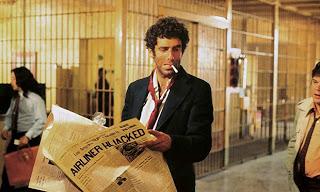
"I'm a born loser. I even lost my cat."
Robert Altman's The Long Goodbye (1973) was initially among his least successful pictures. A pseudo-adaptation of Raymond Chandler, audiences disliked its sour tone while many critics rated it a mean-spirited insult to the creator of The Big Sleep and other detective classics. Provided one isn't expecting a classy Howard Hawks joint, its defeatist aesthetic has a shaggy charm all its own.Philip Marlowe (Elliott Gould) helps his friend Terry Lennox (Jim Bouton) escape LA for Mexico to flee a gambling debt. When Lennox turns up dead, having evidently killed himself, Marlowe learns that he was accused of murdering his wife and stealing $350,000 from gangster Marty Augustine (Mark Rydell). Marlowe seeks to clear his friend's name, mixing up with not only Augustine's goons but hard-drinking writer Roger Wade (Sterling Hayden), his disaffected wife Eileen (Nina van Pallandt) and the weird, wheedling Dr. Verringer (Henry Gibson).
The Long Goodbye goes beyond deconstruction of film noir to full-on demolition. Altman and screenwriter Leigh Brackett spend a bare minimum of time elucidating plot points, providing instead a caustic look at Los Angeles' seedy underbelly. Crooked cops arrest Marlowe without cause, Marty brags about knowing President Nixon, Wade's too interested in booze and gambling to write and Philip's neighbors are hippie women who perform yoga topless. Goodbye's bizarre murder seems less pressing than the social rot it exposes; Chinatown's corrupt but stylish Los Angelinos seem genteel in comparison.
Even Marlowe's dragged off his pedestal: no longer the suave Humphrey Bogart, he's played by Elliott Gould with a perpetual sneer, a half-burnt cigarette at his lips, staggering about as if suffering a perpetual hangover. He has the brains to put things together but struggles to do make an impact. Often he's cast as an observer as the protagonists destroy themselves. All Marlowe has is his friend's memory, his clingy cat and his personal honor, and by film's end he's lacking even those.
Altman provides his usual rambling directorial style, with Vilmos Zsigmond's camera offering long takes of banal conversations and slowly-turning plot points, set to a jazzy John Williams score. His direction pairs urban decay with impressive imagery, with Marlowe's apartment shot in deep focus (with his nubile neighbors writhing about), using dogs and cats to signpost plot developments, and especially the Wade's beach side home. One impressive shot has Marlowe reflected on a window, prowling the beach as the Wades argue. Another set up shows Wade wandering into the surf, his white clothes submerged in pitch black ocean, the soundtrack drowned by the crashing waves and a frantically barking dog.
Elliott Gould's bone-weary performance offers an intriguing antihero: his Marlowe isn't especially likable, but his beaten-down attitude seems an appropriate response to the hellhole he inhabits. Sterling Hayden steals long stretches of the movie with a Hemingway-esque turn that stops just short of caricature. There are comic character turns by David Arkin as Marty's bumbling goon, Henry Gibson as the obsessive doctor and Ken Sansom as a security guard baffling guests with Walter Brennan impressions. Arnold Schwarzenegger has a non-speaking role as a hulking henchman.
Despite flickers of sardonic humor, The Long Goodbye is a thoroughly downbeat experience. The violent climax offers plot resolution but little catharsis; several folks have died pointlessly, leaving society just as badly off as before. This LA could use Bogart's Marlowe, cynical but clear-minded, to clean it up; but Gould's shambling, cranky gumshoe is little more than it deserves.

